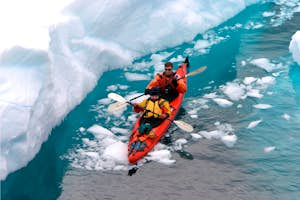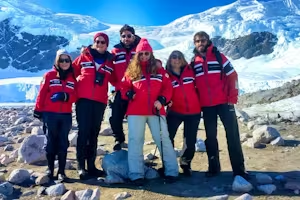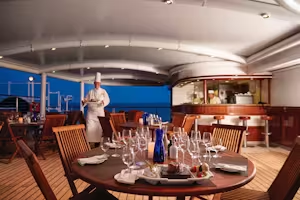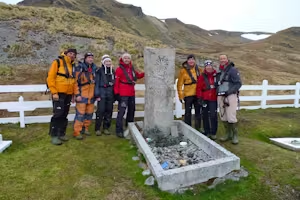
Swoop says
Please be aware that we require you to have a suitable travel insurance policy in place before you depart on your Antarctic adventure. This guide will help you understand more about arranging insurance, but if you have any concerns or questions do get in touch.
When to arrange insurance
Travel insurance is a mandatory requirement for all travellers and is not included in the price of your trip.
We would recommend that you arrange insurance directly after booking, not only to protect your investment as soon as possible but also because some insurance policies may offer a reduced level of coverage if not purchased shortly after paying your cruise deposit.
What your travel policy should include
Gentoo chicks
Swooping above the waves, South Georgia © Renato Granieri
Adelie penguin, Antarctica
Swoop Antarctica is unable to provide travel insurance recommendations due to UK regulations. However, below we have made some suggestions that should help you with your insurance purchase.
When reviewing your intended insurance package there are a number of standard requirements that we think every good travel policy should include:
- Cancellation, delayed departure, and curtailment/interruption costs - it is important that the cancellation value is equal to the total cost of your trip
- Emergency medical and other expenses including medical evacuation, repatriation, and cover for any pre-existing medical conditions
- Financial failure of agent or operator
- Hospital inconvenience benefit
- Personal accident
- Death
- Loss of limb(s)/sight
- Permanent total disablement
- Delayed/lost baggage or lost passport
- Lost personal money or documents
- Personal liability cover
- Disruption including airspace closure
- Missed departure/connection
- Travel risks such as hijack/mugging etc
- Legal expenses
Please note these are general guidelines. For more detailed information on what is required for your specific voyage please refer to your ship operator's terms and conditions, and consider your own individual needs and circumstances. It is also important to check whether your insurance will cover you in the event of any changes to governmental travel advisories which are relevant to your trip.

Swoop says
In the event of a situation arising that you intend to make a claim for, it is important to inform your insurer straight away. They may have a specific process they require you to follow. It’s sensible to keep their emergency phone number and your policy number loaded in your phone contacts.
Cruise requirement
When travelling to Antarctica it's mandatory that your insurance policy includes medical evacuation cover for a minimum of $100,000 per person, however, some operators may require cover of up $250,000 per person. It is important that you check this in advance.
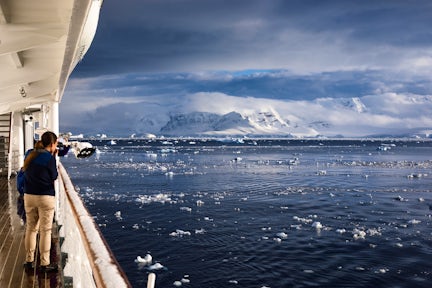
Looking out across the South Shetlands
Topics to discuss with your insurer
Here are some considerations for you to talk through with your insurer prior to purchasing your insurance policy. We strongly recommend phoning the insurer to discuss your requirements as it can be difficult to establish all the necessary answers online.
Please note that this is not an exclusive list and you should ensure that you discuss any relevant personal circumstances which may apply to your insurance purchase.
- Does the cancellation coverage amount cover the full cost of the expedition cruise (plus any flights and hotel arrangements booked separately)?
- It’s important to check that there is no maximum coverage limit, or that your trip cost does not exceed any maximum amount.
- Is a “Cancel for Any Reason” policy available and what are the terms and conditions?
This may give you greater flexibility and coverage but is often only available to purchase within days of your initial deposit payment. - Does the policy cover any specific requirements set out by your operator?
This may include mandatory emergency evacuation coverage to a certain value.
Activities: If you have booked any additional activities during the course of your expedition cruise, please ensure that these are covered within the terms of your policy. For example, snowshoeing.

Teresa Machan says
Having the right insurance for your adventure gives you peace of mind before and during your travels. Taking time to research options and scrutinise the details is a worthwhile investment!
Swoop Expert
Travelling to Chile and/or Argentina
Boarding the plane for King George Island
Chile does not require any specific Covid-19 insurance for entry to, or travel throughout the country. This measure was dropped in 2023, with the exception of Easter Island which does maintain some specific entry requirements. Please be aware this situation may change and it's important for you to monitor the latest situation before travel
Argentina does not require any specific Covid-19 insurance for entry to, or travel throughout the country. This measure was dropped in 2022. Please be aware this situation may change and you need to monitor the latest situation before travel.
Both governments highly recommend having coverage for incidents such as medical costs, quarantine and trip suspension, in case such measures are reintroduced.

Swoop says
We recommend that you have both paper and electronic copies of all of your insurance documents. Pop the insurer’s contact number into the phone address books of everyone in your travelling party, along with your policy number, so it’s easy to access in an emergency.
When travelling to South America
You should be prepared to show your airline your insurance documents if they require these from you.
As well as ensuring your full policy is available on your phone, you should carry a printout (and possibly a spare copy in case you lose one).
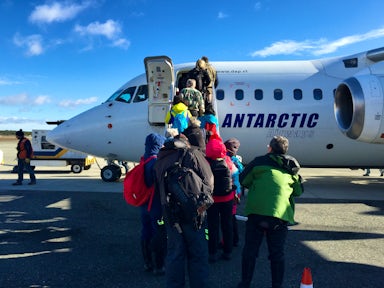
Insurance according to nationality
Swoop Antarctica is unable to provide travel insurer recommendations due to UK regulations. It may be worth contacting a local insurance broker who has a good understanding of the options available in your area, as they may be able to match you up to a suitable policy. We are unable to check the wording or suitability of the policy you are considering; should you have any queries needing clarification please contact the insurer directly.
When choosing an insurance provider, please refer to your ship operator's terms and conditions and consider your own individual needs and circumstances. Please note that if your nationality is not listed below then we are unable to provide information on insurers in your locale.
-
Insurance for North American travellers
For travel insurance providers, past customers of ours have used the following companies, who you may like to contact for a quote:
- Cat70
- Tin Leg
- HTH Travel Insurance
- Travel Guard
- Travelex
- Arch - RoamRight
- Allianz
- Squaremouth (comparison site)
Do check that your policy would remain valid in the event of a Level 4 travel advisory.
-
Insurance for Canadian travellers
For travel insurance providers, past customers of ours have used Manulife, who you may like to contact for a quote.
-
Insurance for UK travellers
For travel insurance providers, past customers of ours have used the following companies, who you may like to contact for a quote:
In our experience standard UK insurance policies often have a lower cancellation coverage than you need to fully protect a trip to Antarctica. Many insurers will offer the option to purchase a “top up” policy to increase this cover – you usually need to phone to discuss this.
It may also be possible to top up an existing policy with a separate provider. It may be worth contacting “Top up my cancellation cover” underwritten by PJ Hayman for more information on their services.
Travel insurance is more than just a safety net; it's your shield against unforeseen events that could otherwise turn into financial burdens.
When it comes to exploring the far reaches of the world, the unpredictability of weather becomes a factor. Much like medical cover, a policy that allows for cancellation is not just a precaution; it's your ticket to worry-free exploration.
As well as insurance being a mandatory requirement for most of our partners, we strongly recommend it for your benefit and require you to sign a waiver if you choose to travel without it.


